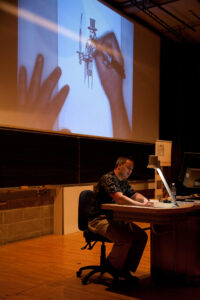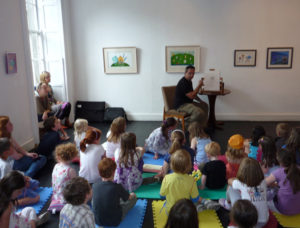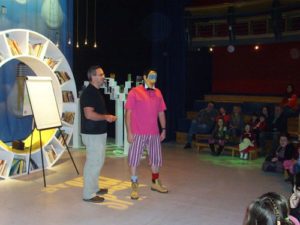There’s been a lot of talk online about authors being asked or expected to do events for free, or virtually for free. So I figured I’d stick my oar in on this.
When I started out as an illustrator, I took crap jobs for crap money, because I figured it was the price of getting established. And it was. There was no back-up or support for illustrators, particularly in Ireland. You were on your own. I sometimes took even crapper money for good jobs, just to get those jobs to have in the portfolio. I don’t do that any more, because I’ve been at this malarky for a long time now, and I expect to be treated like a professional.
But one of the most valuable lessons I learned was that I had to sell myself as a tradesman. If you wanted my work, you had to pay me an hourly rate. If you wanted ideas, I would charge you for the amount of time I figured I could put into coming up with that idea, and what it was worth to you.
 When I was first published as a writer, I had the good fortune to have a novel and a couple of young kids’ books come out in the same year, which gave me a very wide potential audience – something schools and libraries really appreciate. I had never done an event for children, but a few months after getting published, I knew for certain that if I didn’t push my books out there, they weren’t going to sell.
When I was first published as a writer, I had the good fortune to have a novel and a couple of young kids’ books come out in the same year, which gave me a very wide potential audience – something schools and libraries really appreciate. I had never done an event for children, but a few months after getting published, I knew for certain that if I didn’t push my books out there, they weren’t going to sell.
So I picked up a few tips and I started doing events. I didn’t know anything about doing an author session, so it was a steep learning curve. But I took a lot on – basically, I said yes to anyone who asked, for sessions for any age group – so I gained experience fast. And the more events you do, and if you do a half-decent job of them, the more you’ll get asked to do. I was working freelance as an illustrator, so I was able to fit my work around the events for the most part; something that’s very difficult to do if you’re employed.
As I did when I was an illustrator, I took on a lot of badly paid events, and free stuff and daft stuff, because I considered these the price of learning the ropes, getting established and getting publicity for my books. Most authors – particularly children’s authors – start off the same way.
I learned a lot. I learned how to manage a session, how to hold the attention of young kids for an hour or keep surly teenagers engaged for a two-hour workshop, how to handle the hecklers and attention-seekers and domineering teachers and adults talking at the back and people coming in late, the awkward questions and the librarian telling me the session was actually going to be half the time I thought it was. I learned how to talk while I drew a picture and I learned that audiences want to laugh, that they’re waiting to laugh.
I learned very quickly, the difference between a good events organizer and a bad one, and how often that can make a difference to who ends up in your audience.
The investment of time and effort was HUGE, but after ten years of this, I can now walk into a room and start talking from cold, and walk out an hour later leaving an audience – children or adults – smiling, stimulated, satisfied and curious about my books.
That’s not bragging. Any children’s author who’s done a lot of sessions can make the same claim. Part of my training was going and watching other authors whenever I could. Because being an entertaining speaker has become just another part of our job. I can assure you that it was never part of my plan, but it’s a fact of life if you want your books to sell.
If you’ve never done a session from scratch with a bunch of kids you’ve never met, try it and see how hard it is. And I don’t mean just reading them some well-known author’s story, because that’s somebody else’s work you’re reading, not yours, and if you think that’s all authors or illustrators do with their work, you’ve never been to a good session.
And while events are an essential part of getting publicity, if we were to do it for just the publicity, there would be almost no full-time writers, and therefore no one available to do these events, and certainly to do them to the standard that people can expect today.
Let’s say you run a festival, and you want a writer to do it for free – for the publicity. Let’s say they’re a typical mid-level, full-time author, so you’re confident you can get an audience for them: maybe fifty people.

You could maybe get more in than that, but you don’t want to hire a bigger hall, in case you can’t fill it. Let’s be really generous – to keep the numbers simple – and say that the author gets one euro for every book that sells for ten euros (they often don’t) as a result of that session. If every single person in that audience bought a book, that author would get fifty quid for travelling to your event, and performing for an hour with skills and experience that take years to develop. Does that sound reasonable to you?
But of course, it’s rare for an entire audience to buy a copy of a book, and nowadays, authors are getting shafted by discounting along with most of the publishing industry. And because of the way royalties are paid in publishing, your author won’t see that fifty quid for about eighteen months. Yes, that’s the business they’re in, and they accept that. But you are in the festival business, and they are what your audiences are coming to see. The income for your festival depends on their delivery of an entertaining and stimulating session.
Granted, you might be a library running events, but you still need footfall. If you don’t get people through the door, that event is still a failure.
All the various people and organizations who build their businesses around books expect to get paid for the work they do, but it’s astonishing that writers, and to a lesser extent, illustrators, whose work is the foundation of these businesses, are expected to give their time for free, in return for royalties they may eventually earn after every other person involved in the sales chain – most of whom are employed full-time – has been paid first.
Do you work for a company or organization? Would you be willing to travel to another town or county to work for free, in the hope that you might get paid a little more somewhere down the line in return for this work . . . if you managed to excite your customers enough?  Would you be happy to see someone else charge for your services, using your name and skills to attract people to your performance, but pocket the takings, telling you that you’ll get more business out of it? What? More of this kind of business?
Would you be happy to see someone else charge for your services, using your name and skills to attract people to your performance, but pocket the takings, telling you that you’ll get more business out of it? What? More of this kind of business?
Try taking that approach to payment with a builder, or a plumber or the washing-machine repair man next time you’re talking to them.
Yes, we are selling books, but our income is derived from that work in different ways. If you get a musician or comedian to put on a show, regardless of whether or not they have products of their own on sale, you pay them a performance fee, or a percentage of the admission fees. Because they are what people are coming to see.
If you run book events, and all you’re offering in payment is a bit of publicity, you may well get the people who are starting out, who are learning the ropes and still have to find their way. But if you want to draw audiences, you need professional authors who have proven they can deliver. And professionals get paid.
And if you’re running a big, prestigious festival that can draw audiences because it has a powerful brand, and you think you can offer little or no fee on the basis that an author should be grateful they’ve been invited, then bear in mind we’re all talking to each other a lot more these days. Word gets around fast.  And the problem with brands is that once a company’s brand becomes tainted, everything they do and everything they’re associated with becomes tainted too. Negative values can become attached every bit as firmly as positive ones. There’s a lot more competition for festivals out there now, and more and more, popular authors are having to choose between events.
And the problem with brands is that once a company’s brand becomes tainted, everything they do and everything they’re associated with becomes tainted too. Negative values can become attached every bit as firmly as positive ones. There’s a lot more competition for festivals out there now, and more and more, popular authors are having to choose between events.
And those of us who’ve been around a long time, we’ve a funny attitude to all this. Because even though we came up having to do a lot of shit for free, it doesn’t mean we think others should too. Because we know what hard work it is, and we don’t like people taking liberties with other people like us.
Organizations like the Society of Authors, Poetry Ireland, Children’s Books Ireland, Booktrust and the Scottish Book Trust all offer fees that could be used as a base for events organizers to work off, and we could really do with some kind of base standard.
If you want people to bring their time and expertise to events you intend to hold, and you are counting on those people to attract audiences and make your events a success, you can’t expect them to come for free. We’re professionals. And professionals get paid.

Well said, Oisín!
Sometimes I think that there must be something about writers that discourages others from understanding that our time is as valuable as anyone else’s. While many festivals do pay a fee (though often they only cover accommodation and travel expenses), others seem to think that the publicity is enough. It’s not!
Your example of fifty audience members all buying a copy of the book is the ideal state: my experience tells me that for every fifty audience members, we’re lucky if more than two of them buy the book. And, as you say, authors don’t receive as much ten per cent of the cover price. For a ten-Euro book, we might – might – receive fifty cents.
So… What with travelling to and from the venue, plus the preparation time and the session itself, we’re looking at pretty much losing a whole day of writing, in exchange for maybe €1 in royalties eighteen month after the event, and a nebulous promise / hope that the publicity will pay off somewhere down the line. Which it never, ever will.
Certain SF / comic conventions are particularly guilty of that, sad to say. “Donate an entire weekend to our event in exchange for no money! Also, you won’t get any decent publicity out of this because we’ve got a much bigger-name writer as our headline guest and we’ll schedule all your panels against theirs. Have fun talking to an empty room!” Grr…
A similar process applies on a different – but related – level, when a would-be writer asks us to critique their manuscript… They think they’re asking “Please read my book and comment on it because I value your opinion!” but they’re really asking “Please spend a whole day trudging through my book and compiling comments on it. Your rewards for this task are (a) give up the equivalent of a day’s earnings, and (b) have me upset with you because even though I insisted that you should be honest, I actually just wanted to be told how great my book is.”
Well said, Michael!
Here here. No established author should be asked to do events for free.
I met you once when I was maybe in fifth or sixth class, you did a reading of a then yet to be published novel and drew a caricature for our class, which our teacher photocopied for us. I remember the next visit to the book shop nearby I insisted my mam bought all your books for older children and teenagers, and I read them voraciously.
You inspired me to write, and to try to improve my writing. Reading this made me remember when you walked into my classroom, and I realised I’d read my little brother one of your children’s books, and wishing I could do that too.
Just a little something I remember.
I absolutely delighted to hear it, Ciara. Thanks very much!
Some very valid points, but libraries rarely have money for events and authors, so without those who do come for ‘free’, either off their own backs, or through The Reading Agency, libraries would struggle to offer events for customers who possibly cant afford to go to festivals, or are intimidated by them. There are also many authors out there who charge astronomical amounts to do talks etc and are sometimes not worth the amounts they demand!
It doesn’t do anyone any good to charge astronomical amounts, and most writers support events on a local level, but my wife is a public librarian and I’ve been doing events in libraries for years, so I know how the system works. Either people give it priority or they don’t. And you can’t charge one library a fee, and then agree to do another one for free just because they claim they have no budget for it. It’s unfair to those who pay you, and leaves you looking like this is a hobby or something you’ll do for free if they pressure you into it. You just can’t do free events on routine basis, and I certainly don’t – not unless I’ve a long-term relationship with the library (or the librarian!).
I absolutely agree. And its the same the world over. In New Zealand we have many author’s being asked to come to schools for nothing, or attend festivals for nothing. As writers, we have to value our own time and stick to our guns. Because you’re worth it!
A very heartfelt and honest post. As with a lot of things in life, there’s a paradox here. If you are starting off as an author or illustrator, and no-one’s heard of you, no-one is likely to pay a realistic fee. Once you are famous, everyone wants you and the fees you charge mean that most libraries/schools can’t afford you.
The trick is I think to try to be slightly ahead of the curve, committing to build your brand as a reliable and good value performer, generating word-of-mouth amongst event organisers whilst at the same time committing to have the difficult conversations early about fees. Also, if you’re being paid, there is definitely an argument that the organiser is going to work harder to make the event a success – if only to cover their investment! The freebies get bumped down the priority list…
That paradox exists for bookseller’s as well. Many of the events we do do not even break even (for the time, and cost of returns when the books don’t sell). There are often lots of variables which are not under our control which can mean books don’t sell on the day. So we engage in a process similar to this: try our best to pick events which we feel are well organised / we want to meet the author, don’t get depressed when an event bombs, know that some events *will* go well, and that sometimes you get a response from someone like Ciara that make what we do so worthwhile…
Well said Oisin! I mean whenever I’ll be or if I’ll ever be at that stage I know already that I’ll need to do experience. And in order to do so it might be possible do it for free! But for a professional no, it’s not acceptable!
I followed your class for children’s fiction and it was worth every cent to be honest. You’re a great teacher and writer!
And it is right that a person who’s working (leaving aside the narrow-minded kind of people who think that artistic jobs aren’t real jobs- I hate when they say that) is paid for his or her job!
Well said. That goes for the visual arts world too.
Wise Words…
I have been told by a librarian that authors, poets, illustrators etc. shouldn’t be paid for our appearances/performances, because they are helping us sell our products… I didn’t know how to respond, so I said nothing… in future, I’ll just learn this off by heart… or just point the person to this url…
Glad it’ll be useful, Paul!